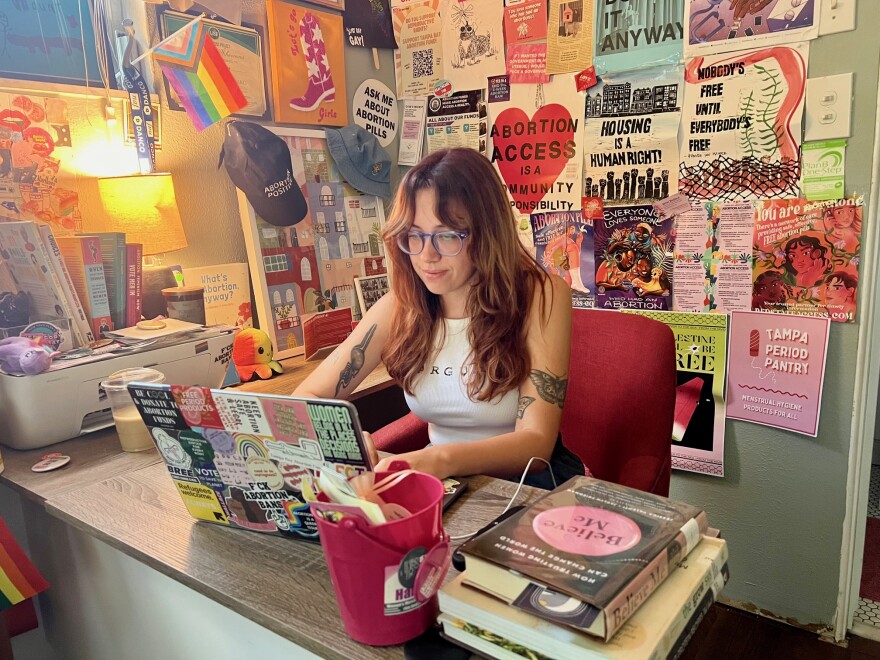The narrow defeat of Amendment 4 in Florida is motivating some people to donate money to groups that support abortion rights, including funds that help people pay for abortion care.
The Tampa Bay Abortion Fund received more than $20,000 in the days after Tuesday’s election, with about 100 people donating, according to Bree Wallace, the organization's director of case management.
Just over 57% of voters approved Amendment 4, which would have allowed abortions until fetal viability — usually around 24 weeks into pregnancy — or after that if a patient’s health care provider deemed necessary. But the measure failed because Florida requires 60% of votes for constitutional amendments to pass.
That means a six-week abortion ban with limited exceptions remains in effect.
“People are mad, and when you're mad you donate, you get out in your community, you organize, you fund raise, and I think that's what people are doing right now,” said Wallace.
For Wallace and fellow abortion fund workers, the news on election night was devastating, but it didn’t change their mission.
“We all got some good cries in and went straight back to the work that we've been doing,” said Wallace.
Abortion funds help cover appointment and travel costs for people needing abortions. Groups in Florida are paying for women to get care within the state if they’re not six weeks pregnant yet. For those past that mark, funds help them travel out of state to get abortions, which can be expensive.

The Tampa Bay Abortion Fund has helped 150 people travel out of state for care since the six-week law went into effect in May. That's three times as many as it did during the first four months of this year, when a 15-week ban was in place.
Demand for out-of-state travel support also increased costs for Emergency Medical Assistance, an abortion fund based in Palm Beach County. The group is on pace to spend $550,000 this year, up from $320,000 last year, according to executive director Jessica Hatem.
“The money that this costs to be able to support people is huge. It’s huge, and I think people are realizing that, but at the same time the need and the circumstances are only going to get worse,” Hatem said.
The increased spending is also due in part to a national partner’s decision to cut funding for patient support this year, which Hatem said leaves local funds with more costs to cover.
Emergency Medical Assistance also had more money come in after the election, though Hatem said, so far, it’s not as large a spike in so-called “rage giving” as funds around the country experienced after Roe v. Wade was overturned in 2022.
Those donations died off as people moved onto other issues. Any boost in funding is great, said Wallace, but she would prefer to see sustained support.
“We might be stuck with [a six-week abortion ban] for another two, four or more years depending on what we can do about it. So I think it's really just trying to make donations come in no matter what, even if it's not headline news,” Wallace said.
Opponents of Amendment 4 are celebrating its defeat, with residents in rural parts of central and Northwest Florida accounting for large numbers of “no” votes. While some defend the law, other abortion opponents are calling for tougher restrictions.
“The only realistic way to ensure that Florida becomes totally abortion-free is for the Legislature to pass complete legal protections for unborn children, from the moment of conception,” Andrew Shirvell, executive director of Florida Voice for the Unborn, said in a statement on Tuesday night.
Advocates on both sides of the issue say they will continue the fight over abortion rights in the next legislative session, which begins in March.
But for abortion funds, Hatem said community outreach is more of a priority, both for fundraising and other efforts. In addition to paying for abortion care, staff and volunteers hand out preventative and emergency contraception supplies in the areas they serve and provide residents with information about reproductive health.
Ramping up those initiatives next year will be critical to building long-term support, she said.
“So as long as we can still get our message out and again show up for our communities, these are wins for us,” said Hatem.
You can find an abortion fund that serves your community on this website.
Copyright 2024 WUSF 89.7


